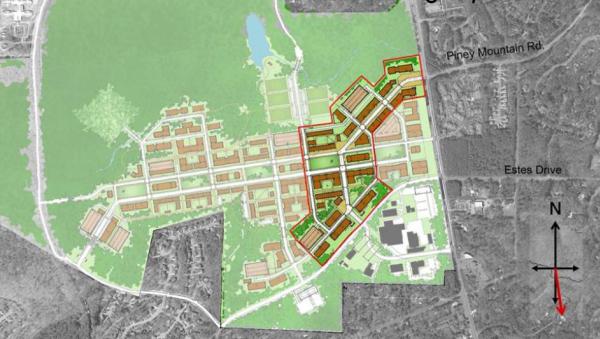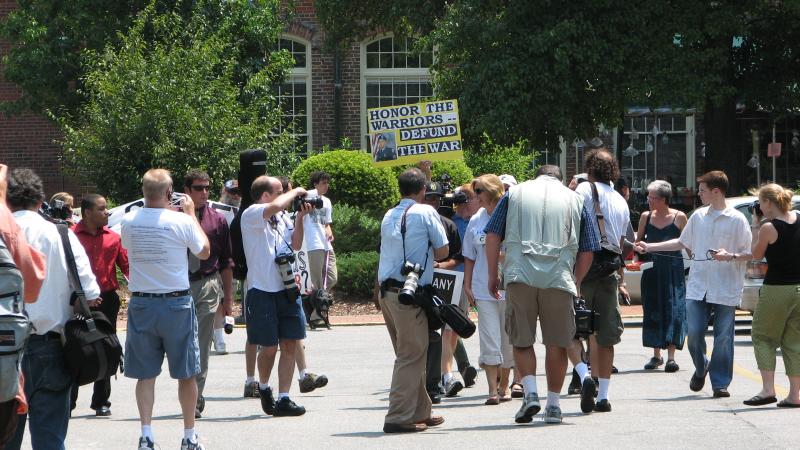Two years ago I ran for Town Council on a platform emphasizing innovation, creativity, responsibility and community involvement ( Campaign 2005 ). In the two years since, I’ve continued to participate in local affairs – praising the good and working to prevent the bad in process and policy.
But today’s campaign platform, like that of two years ago, isn’t built on correcting our current Council’s mistakes but upon a foundation of specific, measurable, verifiable measures to enhance our residents future and preserve the charm that has made Chapel Hill a “Southern Part of Heaven”.
Why run? As a member of several Town advisory boards, a close observer of our governmental process and an activist interested in improving upon our Town’s successes, I have become more and more concerned as our leadership strayed from some bedrock principles of good governance.
As a member of Council, I will promote policies that speed the wheels of progress, that increase the level of citizen participation and that will set a new course for Chapel Hill’s Council.
What, specifically?
In the next four years I will work hard to make sure our Town’s fiscal policy doesn’t continue to be dictated by political expediency. Transparency, openness and inclusiveness will be first and foremost in developing our Town’s budget.
We can’t borrow from tomorrow’s seed corn to pay today’s debt. We can’t dip into our children’s college fund because we’re not willing to tighten our belts. We must build our financial foundations on sturdier grounds than the expectation that next year will always be better than this year – that housing values will forever escalate, that sales tax surprises are right around the corner.
We are entrusted with our citizen’s hard-won dollars, not “units” to be extracted as needed, and every action we take must reflect that recognition. When we negotiate and then take on a new burden on our citizens behalf we owe them a regular and accurate accounting. We should err on the side of caution and not become so obsessed with grand dreams so as to dispense with good sense and good policy.
Affordable housing should mean housing – square footage on the ground. We cannot continue our Town’s addiction to payments in lieu. We must be prepared to accept housing when it becomes available – to be nimble and flexible in adapting to current conditions.
And while affordable housing is important, affordable living must be our first and foremost goal.
Our town has adopted policies that are driving diversity from our community. In our rush to support gold-plated condos and a caviar lifestyle we’ve forgotten that our Town’s historical constitution and strength is born of a wide cross-section of interests and means.
Affordable living necessitates policies that encourage folks to stay awhile. We need a new attitude that supports our long term residents in keeping their homes and our newest residents in their desire to move from transitional housing to homes.
Leadership does not mean going it alone. Our community is blessed by many resources, our citizens being a source of strength and talent we cannot continue to ignore. We must not wait for them to come forth but nurture their involvement – and take their counsel even when it goes against our initial impetus.
Finally, when we call on others to do what’s best – environmentally, social justice, human services – we must lead by example and not resort to “do as I say, not as I do”.
Why boot the incumbents?
In the last 18 months, we’ve seen some of our Council become so enamored, even obsessed, with their Downtown development plans, that they’ve wavered from their obligation to maintain our Town’s sound fiscal foundations.
Delay is a matter of course for this Council. Just two weeks ago the Council received an independently conducted technology assessment that called for a number of innovative, cost reducing, improvements that I, other concerned citizens and our now disbanded citizen-led Technology Advisory Board had made more than 5 years ago.
And rather than make key structural and organizational changes in the way our Town functions, they pushed off to tomorrow what needs to be done today.
As we know, delay costs. In some cases, delay costs dearly.
Over the last few years, while the Council has maintained their policy of citizen comment on the issues before them, they have become partially deaf to critiques of their plans. Nothing sounds so sweet as the chorus of “yes, yes, yes” but paying attention to the “nayes” can strengthen any policy. Add to that recent examples of political gamesmanship and imprudent streamlining of public hearings to see how citizen discourse and debate has taken a backseat to winning their way. Public policy has suffered.
Though potentially ego bruising, integrating citizen feedback can only make our government work better.
Beyond ignoring professional assessments from the professors of UNC’s Kenan-Flagler business school on the Lot #5 development debacle, this Council has stood quietly by while the Mayor dispensed with the Horace-Williams Citizen Committee (HWCC). The HWCC, of which I was a member, stood poised to make additional, substantive, contributions, from am informed citizens perspective, on UNC’s Carolina North project.
Some Council members appeared worried, that they couldn’t control the outcome of this committee’s work.
Certainly an independent and non-political analysis might yield answers that this Council didn’t want to hear but, again, that leads to poor results. Results, for instance, like the Lot #5 money-pit, underwritten by our residents, carrying a quickly escalating citizen borne commitment of $20 million – a project whose primary beneficiary is a private development company.
Yes, the Council does sometime listen. Candidate Hill took my suggestion to make Lot #5’s affordable housing more family friendly and ran with it. And the Council, after years of lobbying by folks like myself, did decide to invest in community-owned networking infrastructure to meet the economic and social demands of a new century. Yet, in-spite of assurances to the contrary, they have yet to involve the community in this vital community serving project.
What of the Downtown Parking Task Force, on which I served? Trying to resolve some of the parking misery in our Downtown district, this committee did some of the best work I’ve ever seen any board perform over the 7 years I’ve closely participated in Town affairs. Members of this task force were eager to continue – to help with the implementation of a number of no-cost or low-cost improvements to make our Town center more inviting, more friendly.
While this groups practical advice was put aside (for now we hear), the committee’s recommendations to reduce the cost of parking became, perversely, a call to raise parking rates Downtown.
“What’s the matter with raising prices by ‘two units’?” as one Council member asked. “Units”, it appears, is how the current Council sees our citizens and visitors hard-earned dollars.
Again, political gamesmanship, closing ranks, trying to bolster this year’s incumbent candidates prospects, overrode good and fair public policy. At least the work of that committee hasn’t been added, as one long time resident and board participant commented, to the “stack of dusty reports” generated by our advisory boards that litter Townhall.
One incumbent Councilmember, Bill Strom, recently complained that he couldn’t work with the Orange County Board of Commissioners to set policy.
He has had eight years to work on that issue, and so many more, how would eight more years of Bill or four more of Cam and Sally, benefit our community? I expect a flurry of proposals this Summer from our incumbents and my question to them will be simply “Why are we just now hearing about this? Why wait?”
The trend is set. These few of many examples show a Council that has lost their way.
Over the next few months I look forward to, once again, meeting with our citizenry, to discuss how our Town can maintain its charm while becoming not only an even better place to live but a sustainable, growing, vital and creative community that will lead others by example.









